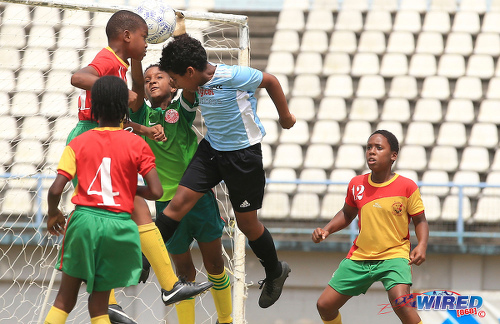The Trinidad and Tobago government will not actively block youth sporting competitions, like the Youth Pro League, from going ahead before September. However, they will need to find their own venues to play on.
This morning, Sports Company of Trinidad and Tobago (Sportt) official Justin Latapy-George spelt out their policy position to national sporting organisations. And, although Chief Medical Officer Dr Roshan Parasram and Commissioner of Police Gary Griffith have differed on the subject, Sportt will follow the CMO’s guidance.
So, all government-run sporting facilities—including the national football stadia—will not be made available for any children’s sports.
“[…] As a special interest company of the [Ministry of Sport and Youth Affairs], all policies, procedures, etc of the GORTT, inclusive of any laws of the Republic of Trinidad and Tobago,” stated Latapy-George, “must, and will be, adhered to by Sportt.
“As such, please note that Sportt’s current position re the classification of child communicated by the Chief Medical Officer (CMO), and the limitations articulated relative to this classification, will be adhered to by SPORTT.
“In addition to this, please note that as a general rule of thumb, all policies, procedures, laws, etc enacted nationally will always be automatically applied to Sportt, when and where relevant.”
Sportt corporate communications officer Kevin Garcia confirmed that Latapy-George’s email was an accurate representation of the body’s internal policy, which will immediately impact on a variety of youth sport including athletics, swimming, hockey and gymnastics.
The debate on whether or not youth sporting competition should be permitted over July/August—traditionally the high period for such activities—came into focus recently as Griffith insisted that children were free to play in organised competition and encouraged them to do so.
“The CMO does not draft, approve, or enforce laws,” said Griffith, in a statement sent to Wired868. “I have received absolutely no policy from any government official to stop any young person from taking part in sport.
“In fact, as the CoP, preventing or trying to persuade young people not to play sport after being boxed in their homes for months, is an avenue that can frustrate many young persons. And hence their energies can very well be diverted in non-productive, if not criminal avenues.
“Hence these continuous comments trying to prevent young people from playing sport, are indeed a liability from a TTPS perceptive, and does not help us in our role and function.
“[…] When certain persons never kicked a lime in contact sport, they may not understand the bigger picture.”
However, Minister of Health Terrence Deyalsingh backed Dr Parasram at a virtual media conference on Thursday—even as he admitted that there were no regulations that prohibited children’s activities.
“We cannot legislate for everything—there comes a time when parents have to make a decision,” said Deyalsingh. “These are your children [and] with the evidence of the changing epidemiology and how children under five are now dying, […] are you prepared to take that risk with your child?”
For Sportt, Dr Parasram’s advice is as good as law. Youth sporting activities will remain on hold at state facilities until September.
It is uncertain whether the Sportt decision would affect the Youth Pro League, since most youth football teams now use community grounds. However, YPL organisers hope to get written clearance from the CMO or the Ministry of Health—so as to placate parents.
A written blessing from the Ministry of Health, under the current circumstances, is unlikely.

